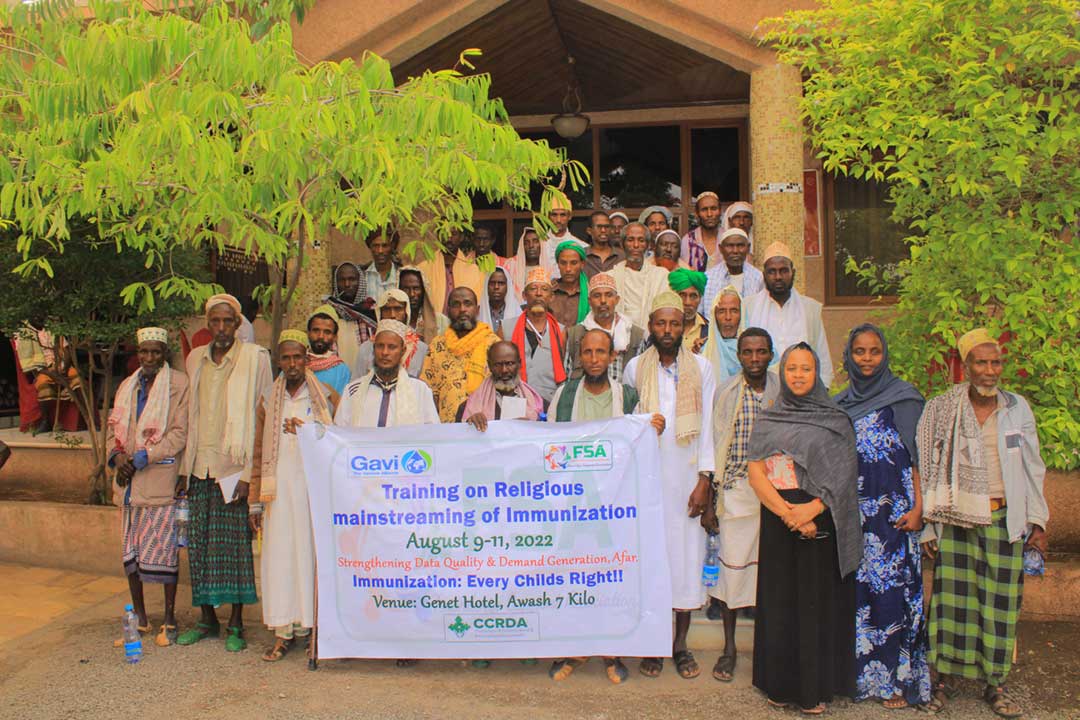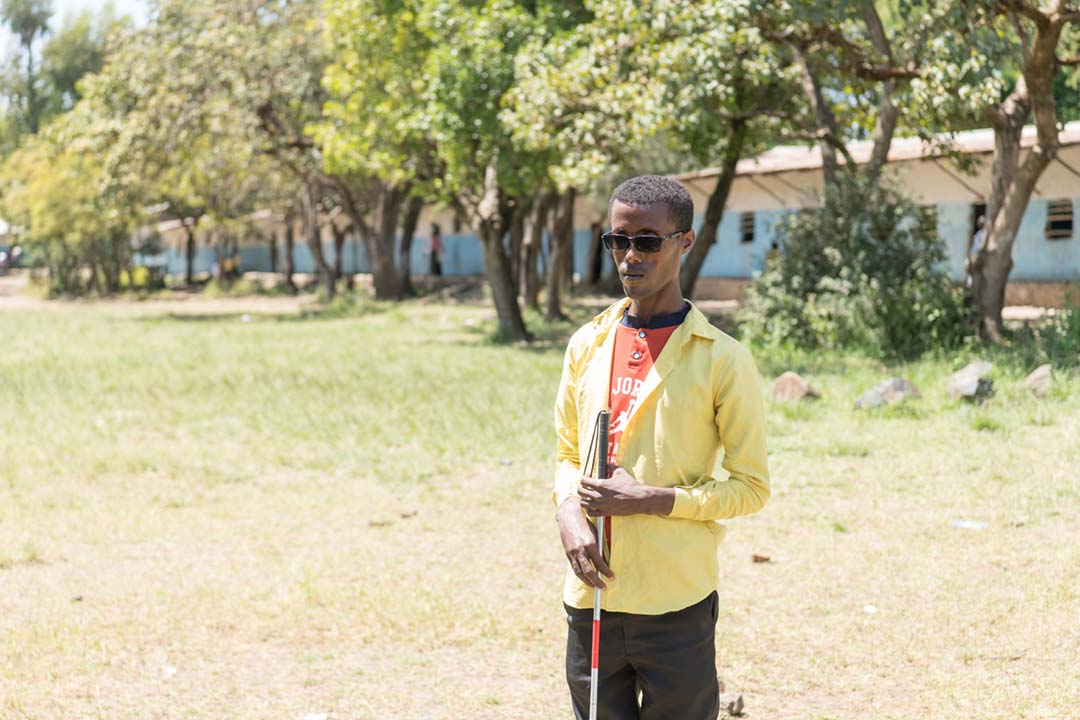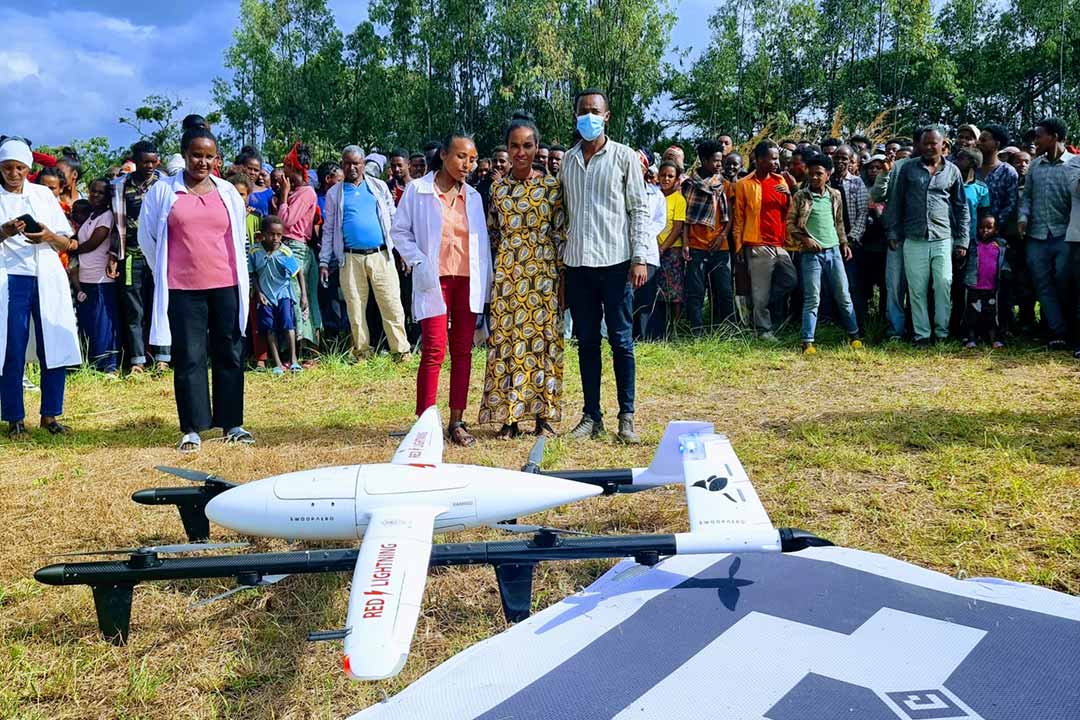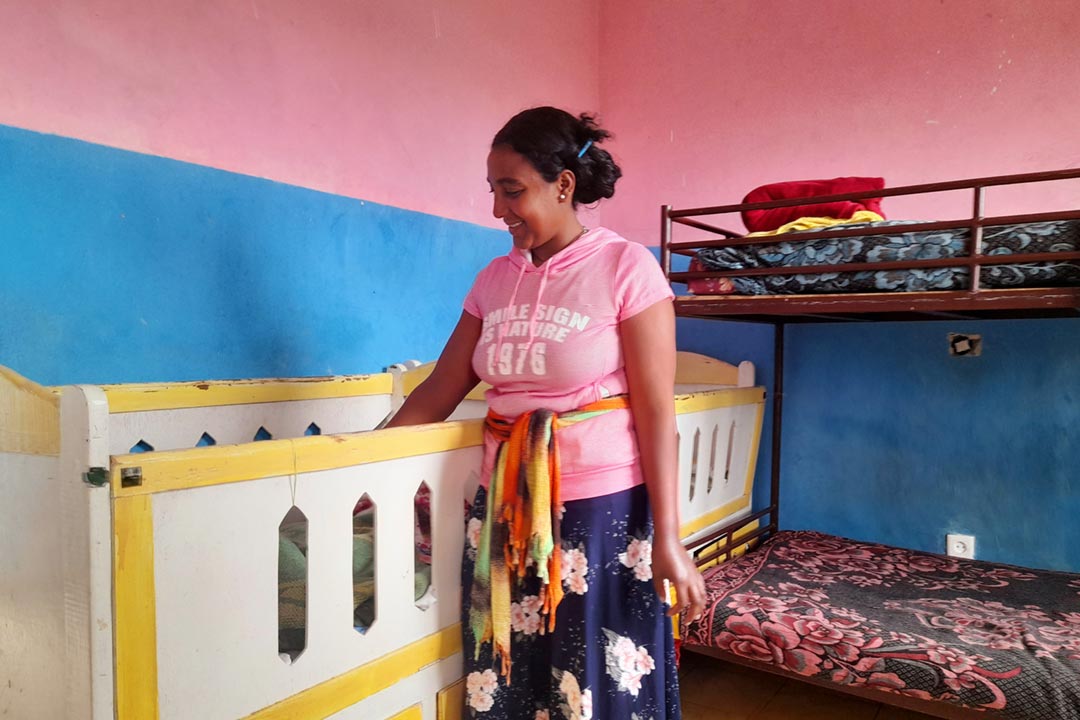No mountain high enough: Ethiopian vaccinators climb to reach missed-out children
Mountainous Ambassel in Ethiopia has limited road access, a spotty electricity supply and, local authorities say, the lowest immunisation rates in Amhara region. Health workers like Meseret Belay are trying to change that – on foot, one five-hour trek at a time.
- 7 February 2023
- 5 min read
- by Solomon Yimer
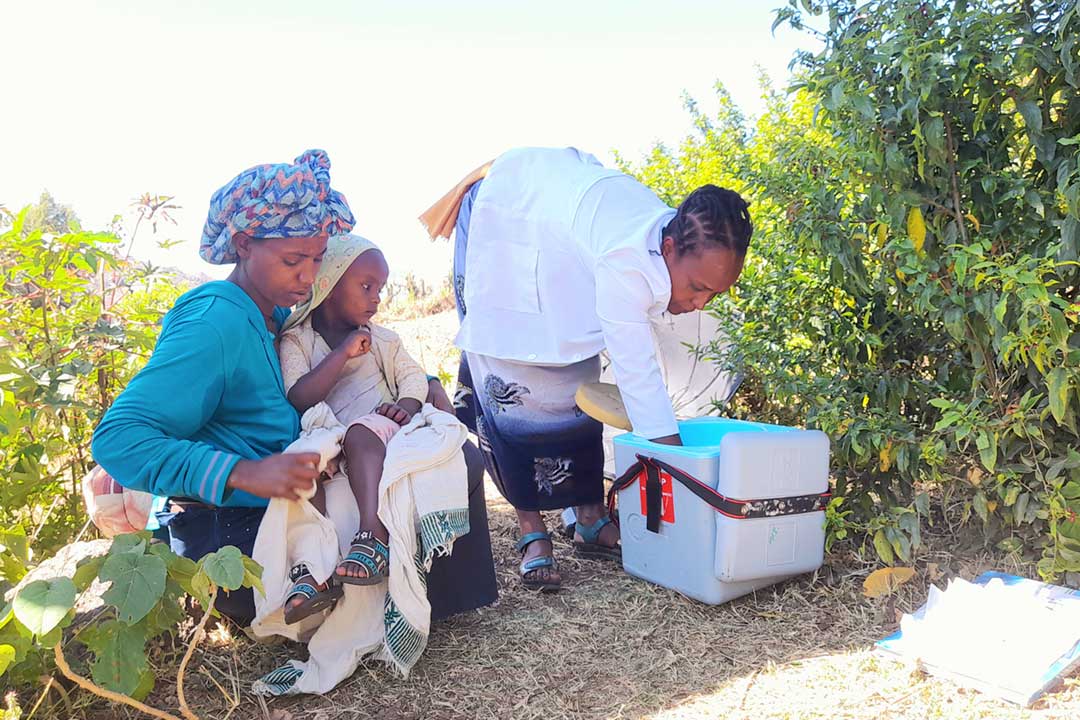
It's early morning at Kolet Health Centre in Ethiopia's mountainous Ambassel district, and health worker Meseret Belay is arranging a variety of vaccines and necessary tools. Today will be very busy for her, as she plans to visit an isolated hill-village to bring vaccines to children who have missed their routine shots.
She double-checks that she has all essentials before she heads off for Agamssa, one of the remotest among the 18 villages in Kolet kebele, the administrative area she's responsible for.
“Though there are many challenges in working in these remote areas, I am very happy serving the community. When I see children become prevented from diseases, I always feel proud of my profession.”
- Meseret Belay, health worker
Like many rural villages, Agamssa is far from any fixed vaccination sites, making it difficult for parents to bring their children to the clinic for their shots. To compensate, health workers make arduous outreach journeys on a regular basis.
"Each time, we check our immunisation record to see which children misses which type of vaccines, and promptly schedule appointments for catch-up vaccinations," says Meseret, displaying her list of at-risk Agamssa children. "Sometimes we also find children who have never been vaccinated at all," she adds.
This year alone, Meseret and two of her colleagues have reached hundreds of children with catch-up vaccinations, most of them in villages that, like this one, can only be reached by trekking long distances across country.
Today's journey is not going to be easy. Agamssa, a village of some 80 households, is located in the mountains, and Meseret will have to travel across rugged and rocky terrain. Fully aware of the looming challenges, and carrying the vaccine box on her back, Meseret sets off on foot.
After travelling for five hours, she finally arrives at Agamssa. She sets her vaccine cooler box down on a bare patch of earth between some low shrubs. A large rock will serve as her patients' chair. Her 'clinic' is now in session.
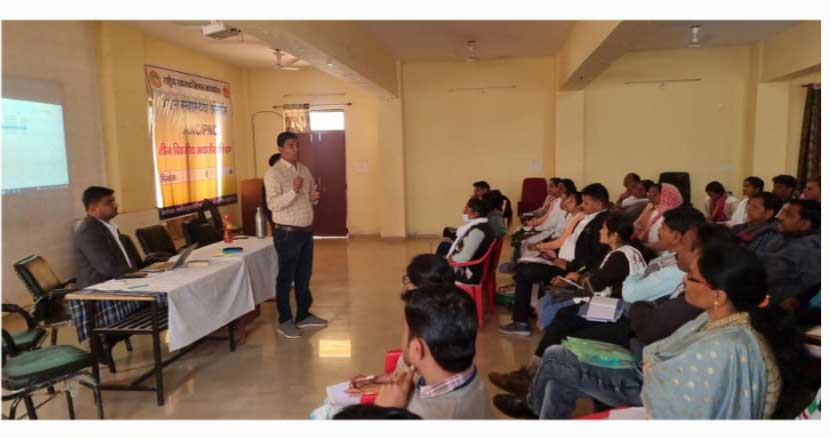
Credit: Solomon Yimer
She doesn't have to wait long. The parents have been notified in advance, and are on their way. As a matter of course, before heading to these remote locations, Meseret sends out messages about the planned vaccination session to community leaders, who, in turn, rally the parents of affected children in the villages.
"As we have lists of children, we send messages to each parent through local community leaders," she says. "The announcement ensures that people are aware of the vaccine drive and are able to gather at the designated vaccine site."
Meaza Teshome, a 28-year-old mother, is the first parent to arrive. Her two-and-a-half-year-old son has been sick for the past three weeks, and consequently missed his last vaccine appointment. Worryingly, that was his second missed appointment: due to family issues: Teshome had been unable to bring him along for the session before that too.
Have you read?
"I am so happy that my child is getting the missed vaccines today," says Meaza, with her son on her hip. "In the future I won't make my child miss his vaccines, not in any case."
Meseret smiles as she administers jabs to the previously missed-out child. Her mood seems to lift as more and more parents began to arrive at her improvised outdoor clinic.
"Though there are many challenges in working in these remote areas, I am very happy serving the community," says Meseret. "When I see children became prevented from diseases, I always feel proud of my profession."
The community members are also grateful for her hard work and dedication. They know that without her, many of their children would not gain access to the life-saving vaccines they need.
"Most of the parents understand the benefit of the immunisation, however due to several reasons, children might miss routine immunisation sessions," says Meseret. "Mothers have to walk for more than three to four hours to reach the health centre and then make the return trip to get their child the missed shots," she explains.
After vaccinating around 30 children, Meseret realises she has run out of time to make it back across the mountains to her own village. She decides to stay the night in the village – a local family has offered her a bed – and return to Kolet in the morning.
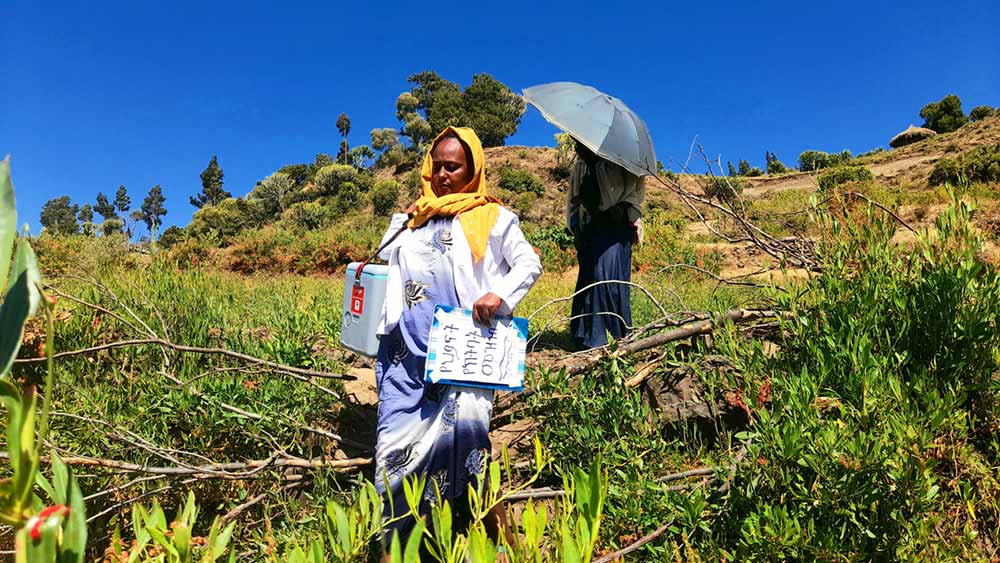
Credit: Solomin Yimer
When Meseret first came to this area nine years ago, the community were not particularly interested in bringing their kids to immunisation sites, she says, and vaccine hesitancy was common among the locals.
"Parents were not willing to bring their kids for immunisation and we were challenged to reach children with routine immunisation," she says. "Thanks to collaborative efforts of the health workers, community leaders, teachers and volunteers in the community, we have seen great improvements in vaccine coverage in our kebele."
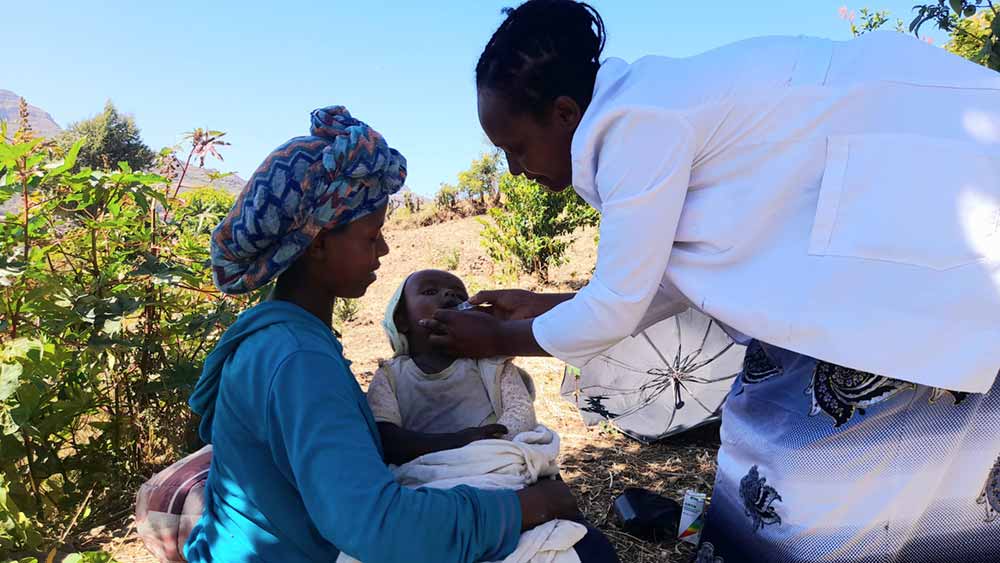
Credit: Solomon Yimer
However, limited road access to remote villages, absence of electric supply and a lack of trained staff continue to pose great challenges to health workers in Kolet. "We have solar refrigerators to cool vaccines. But we are challenged in the rainy season when clouds are covering the sunlight. I wish we would have sufficient electric supply throughout the year," she says.
These challenges are not limited to Kolet. Most of the kebeles in this area have no access to electricity and roads, leaving them isolated from the district headquarters and its resources.
According to Eshetu Serte, head of the Ambassel District health department, the mountainous terrain that covers the majority of this area poses a significant challenge for reaching children in remote communities with life-saving vaccines. Only a few of the kebeles are accessible by road, he says, and there is lack of electricity at most health posts.
Unsurprisingly, vaccine coverage in mountain villages tends to be lower than in those kebeles that are on the road network. "We are doing our best to fill the gaps by bringing vaccines to these remote villages, but we cannot do it alone," Eshetu says. "We need the support of all stakeholders and partners to make sure that lifesaving vaccines reach the most vulnerable children."
